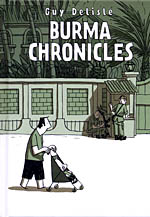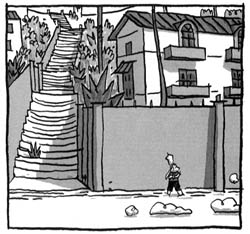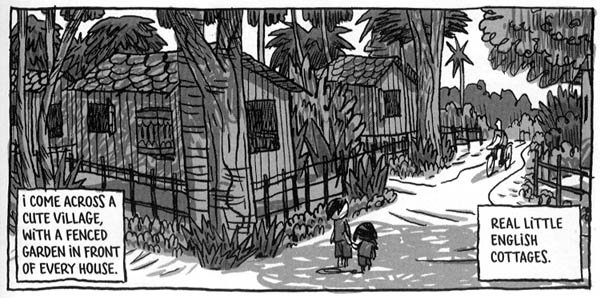 By Guy Delisle
By Guy Delisle
272 pages, black and white
Published by Drawn & Quarterly
One of my favorite travel books from the past couple of years has got to be Guy Delisle’s Pyongyang: A Journey in North Korea. Traveling to the capitol of perhaps the most notoriously isolationist country in the world, Delisle shared his experiences in a graphic novel that was both fascinating and informative. When I heard that his latest book, Burma Chronicles, was about his living in the a foreign country for an entire year, I was more than a little excited. His stay wouldn’t be just for a month or two, but for such an extended period of time that it held many more possibilities. What I found? Not entirely what I expected.
Delisle’s wife Nadège works for Médecins Sans Frontières (Doctors Without Borders), a humanitarian organization that sends doctors to countries in desperate need. When she accepts a year’s position in Burma (or Myanmar, the name that the military junta that controls the country now call it), Delisle thinks he has a good idea of what to expect in this southeast Asian country. What he actually encounters, though, is at times stranger and more implausible than anything he’s come across before.
 One of the things I loved about Pyongyang was how well it illustrated visiting a country where everyone acts in lockstep to the will of their ruler. There’s no dissention, no arguments, just an entire nation of people who do everything that’s expected of them. With Burma Chronicles, that’s very much not the case. Some of the most interesting sections of this book are about the relationship of the people of Burma to the military rulers that dominate the country. The people of Burma are regularly apologizing to Delisle and his wife over all the inconveniences and outright madness that goes on. It’s those sort of encounters that make Burma Chronicles so interesting, as he finds pages in his magazines cut out, or entire DVD shops are forced to get rid of all non-Burmese production DVDs. And of course, the unseen figure of Aung San Suu Kyi overs over the entire book, the winner of the 1990 elections who was forbidden to take office and has been under house arrest on and off since 1989 and has so far served a full 13 years. Living near where Delisle’s family is, it’s hard to not smile at Delisle’s attempts to be able to walk by her house, even as the idea of being trapped in house arrest for years at a time is chilling.
One of the things I loved about Pyongyang was how well it illustrated visiting a country where everyone acts in lockstep to the will of their ruler. There’s no dissention, no arguments, just an entire nation of people who do everything that’s expected of them. With Burma Chronicles, that’s very much not the case. Some of the most interesting sections of this book are about the relationship of the people of Burma to the military rulers that dominate the country. The people of Burma are regularly apologizing to Delisle and his wife over all the inconveniences and outright madness that goes on. It’s those sort of encounters that make Burma Chronicles so interesting, as he finds pages in his magazines cut out, or entire DVD shops are forced to get rid of all non-Burmese production DVDs. And of course, the unseen figure of Aung San Suu Kyi overs over the entire book, the winner of the 1990 elections who was forbidden to take office and has been under house arrest on and off since 1989 and has so far served a full 13 years. Living near where Delisle’s family is, it’s hard to not smile at Delisle’s attempts to be able to walk by her house, even as the idea of being trapped in house arrest for years at a time is chilling.
The rest of the book really varies in terms of interest; a fair portion of the book can be best described as, "Boy, foreigners sure are strange." It’s a lot of little travel vignettes that could have happened in just about any travelogue, Burma or elsewhere, and they’re easily the weakest part of the book. They’re not bad, certainly, but after delving so deeply into the culture of North Korea and China in his books Pyongyang and Shenzhen, it’s a slight disappointment here to see these other stories tossed off so casually and without any heft to their narrative. On the other hand, the times that Delisle does immerse himself in the local culture are really strong; towards the end of the book, his three-day stay at a monastery is one of my favorite portions of the entire book. You get such an idea of what a monk’s life might be like (especially considering that monks are forever in both the forefront and background of at least half of the stories in Burma Chronicles) that even if you forget his searching for illegal software, or forgetting his towel before taking a shower, this will stick with you. At the end of that experience Delisle wistfully says to himself, "If I’d known, I would have come here from the start of my stay and not waited till the end." I can’t help but join in that sentiment.

Delisle’s stripped down, simple art style is charming. Perhaps more importantly, it is a great sort of "everyman" art, letting the reader insert themselves into the travelogue if they choose to imagine it as such. With getting an entrance visa to Burma difficult at best even if for humanitarian reasons, Delisle’s Burma Chronicles is probably the closest that most people will ever come to seeing the country for themselves. That said, I do love how he draws the surroundings in Burma; when he’s drawing locations like a cramped paper store, or the streets winding through his neighborhood, you get such a clear, beautiful glimpse into this other country.
I almost hate to admit that in the end I actually enjoyed Pyongyang more than Burma Chronicles, but don’t let that chase you away from this book. Burma Chronicles is a strong, fascinating book about a part of the world that most people will probably never visit. I think that after such high expectations from Pyongyang, though, Delisle’s much more casual, lighter portions of Burma Chronicles couldn’t help but disappoint a tiny bit. If I’d never read anything by Delisle before, I doubt I would have never noticed what I was missing. Regardless, it’s definitely a book I’m glad I read, and the next time Delisle travels to a foreign country, I hope he creates a book about it too. I know I’ll be ready and waiting to read it.
Purchase Links:
